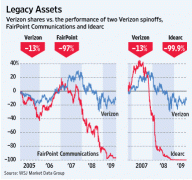 Facebook meets FriendFeed — Much of today’s massive coverage of Facebook’s planned acquisition of social network aggregation service FriendFeed seems to presume that readers know what FriendFeed is. My Slate article from last August is still a good intro. FriendFeed now crawls more than 50 sites and delivers what’s now being called “real-time search.” That means you can leave your search results window open and watch new results pop in at the top of the page, often in a minute or less.
Facebook meets FriendFeed — Much of today’s massive coverage of Facebook’s planned acquisition of social network aggregation service FriendFeed seems to presume that readers know what FriendFeed is. My Slate article from last August is still a good intro. FriendFeed now crawls more than 50 sites and delivers what’s now being called “real-time search.” That means you can leave your search results window open and watch new results pop in at the top of the page, often in a minute or less.
FriendFeed co-founder Paul Buchheit took these photos after the late-night closing of the company’s acquisition deal. Facebook CEO Mark Zuckerberg’s disinterest in having cameras pointed at his face — he declined to participate in a guaranteed-hit book about the company’s founding — has become part of his personal brand.
Technology blogger Robert Scoble had a lot to do with FriendFeed’s word-of-mouth marketing. In fact, FriendFeed is the only way to actually keep up with the hyperactive Scoble. Just an hour ago he blogged, or tweeted, or wrote somewhere on the Internet where FriendFeed found it: “So, who is leaving FriendFeed? I probably am.” Not empty-handed, I hope.
[Photo: Paul Buchheit]
AI Weekly
The must-read newsletter for AI and Big Data industry written by Khari Johnson, Kyle Wiggers, and Seth Colaner.
Included with VentureBeat Insider and VentureBeat VIP memberships.
 Verizon’s CEO is “one of the best deal makers of his time, or one of the worst” — The Wall Street Journal reports that Ivan Seidenberg’s firm dealmaking drove shares of FairPoint and Idearc down to prices that, in the Journal’s words, “sucked the life out of the buyers,” who turned out in some cases to be Verizon shareholders. They received controlling interests in companies whose stocks now trade for pennies.
Verizon’s CEO is “one of the best deal makers of his time, or one of the worst” — The Wall Street Journal reports that Ivan Seidenberg’s firm dealmaking drove shares of FairPoint and Idearc down to prices that, in the Journal’s words, “sucked the life out of the buyers,” who turned out in some cases to be Verizon shareholders. They received controlling interests in companies whose stocks now trade for pennies.
[Image: The Wall Street Journal]
Lenovo’s biggest investor seeks to sell 29 percent of the company — Legend Holdings wants $404 million for part of its 65 percent share in the fourth-largest PC maker. “It will be one of several Chinese companies, but we don’t know any names,” a spokesperson unhelpfully told the New York Times. The Times reminds readers that Lenovo was originally spun off from the state-owned Chinese Academy of Sciences in 1984 as Legend. In 2003, the company changed its name and then in 2005, Lenovo bought IBM’s personal computer business. Today, Lenovo has lost money for three quarters in a row, despite thousands of job cuts. The positive spin being put on the sale is that it’s “part of [the Academy’s] long-term plan to shift holdings in Legend to market-oriented companies, rather than state-run institutions.”
Google testing new search infrastructure — The company wants feedback “only on the differences between Google’s search results and our new system.” On the new site, a vanity search for my name pushes Twitter down from #3 to #4 and replaces #3 with my VentureBeat author page. That’s all I need to know about it for now.
Cellphone users diverging into two camps — A new report by Nielsen says that while plenty of people buy iPhones while complaining about AT&T’s service, more buyers are now looking for cheap plans above everything else.
VentureBeat's mission is to be a digital town square for technical decision-makers to gain knowledge about transformative enterprise technology and transact. Learn More